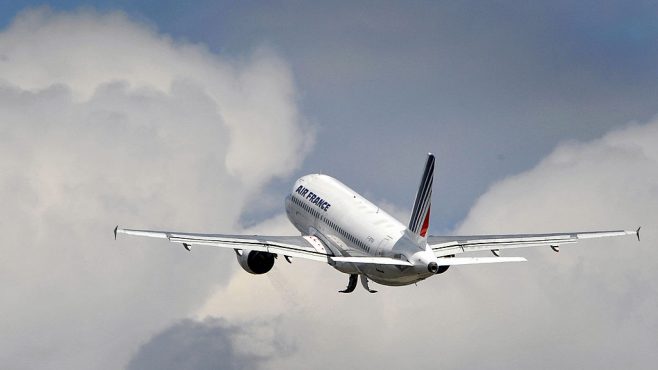The decision by the French parliament this month to approve legislation banning all short-haul internal flights where train alternatives exist has received plenty of attention, but the move to put climate considerations top of the list for transport decisions is largely symbolic.
The idea of people flying from Paris to Lyon, Nantes or Bordeaux when fast train connections are available may infuriate environmentalists, but short-haul flights make up only 0.8% of French aviation emissions, says environmental NGO Transport & Environment (T&E).
Long-haul flights, with no real transport alternative, are the real problem. Just 6% of European flights – all over 4,000 km – create half of aviation’s CO2 emissions, show Eurocontrol figures. These flights are almost always leaving EU airspace, meaning they are not covered by the EU Emissions Trading System and the EU has little ability to impact them. In short, these flights are unaccountable for the carbon they emit.
All emissions reductions are important, and focusing on short-haul flights, for which it is much easier to find alternatives, should be recognised as a step in the right direction if it is a genuine effort. However, Air France’s move would seem to be mainly PR for the aviation industry.

The law will extend the requirement on Air France to all airlines operating in France. However, just like the conditions placed on the industry in exchange for the bailout money it received from the government to help it keep afloat during the Covid-19 crisis, there are a number of exemptions. These will water down its impact.
First, the measure only impacts internal flights, meaning it would still be possible to take a flight between Paris and Brussels or London instead of using the much less CO2-intensive Eurostar or Thalys train service.

US Tariffs are shifting - will you react or anticipate?
Don’t let policy changes catch you off guard. Stay proactive with real-time data and expert analysis.
By GlobalDataSecond, the threshold bans flights when there is a train route of less than 2.5 hours, significantly less than the four hours recommended by France’s Citizens Convention on Climate, which comprises 150 members of the public selected by President Macron in 2019 to advise on climate measures. The law’s low threshold excludes high-speed routes like Paris to Marseille, which at three hours is still faster than flying when travelling to and from airports and security processing is taken into account.
Third, the restriction excludes “feeder flights”, a short-haul flight that connects passengers to a long-haul flight. Since French long-haul flights usually leave from Paris, it effectively means short-haul flights to and from anywhere in France to Paris will still be allowed – and because France’s metropole rail network is centred on Paris, these were the routes that might have been phased out. Austria, on the other hand, included feeder flights in the environmental conditions tied to its airline bailout.
If France’s measure can finally spur the construction of high-speed rail lines between cities, bypassing Paris, it would be a good development for a variety of reasons.
Today, it is impossible to take a direct train between Lyon in the country’s east and Bordeaux in the country’s west – travellers must take an illogical journey up to Paris and switch trains. The short-haul flight option remains the most efficient route in this instance and will remain so after the new law is implemented.
On average, planes emit 77 times more CO2 per passenger than a train on short-haul routes. Establishing new high-speed rail services away from Paris would help regions develop and contribute to quality of life, given the stringent and time-consuming security checks undertaken at airports.
However, we should be realistic about the limits of high-speed rail when it comes to lowering aviation emissions. Even a major modal shift from air to rail for short-haul flights would have limited potential for emissions savings, suggests a study published last year by Koios Strategy, commissioned by T&E. Even connecting all major European cities with high-speed rail would deliver only a 2–4% reduction in overall emissions from EU aviation, it found. The bigger savings would come from a road to rail shift.
Going beyond PR
Given the increased media attention and concerns from consumers over the climate impact of flying, airlines are looking for ways to suggest they are taking their emissions seriously, but away from big PR announcements they are failing to take even the most basic steps.
At an online event organised by the travel comparison platform industry association EUTravelTech last week, the website Skyscanner said it would like to give consumers tools to compare the emissions of various flights. However, it is unable to do so because airlines are failing to provide such information in a transparent, standardised way, claimed the company.
For the moment, the only way to significantly reduce aviation emissions is to reduce how often we fly. That has happened naturally during the pandemic, with the website Flightradar24 reporting a 42% reduction in flights last year compared with 2019. Whether we like it or not, we should work to reduce, not increase flights.
The massive bailouts being awarded airlines with taxpayers money means we are now all part owners of these companies. We should all demand that airlines take real action to curb their emissions, not simply make eye-catching gestures. That should include some serious work to decarbonise long-haul flights.


